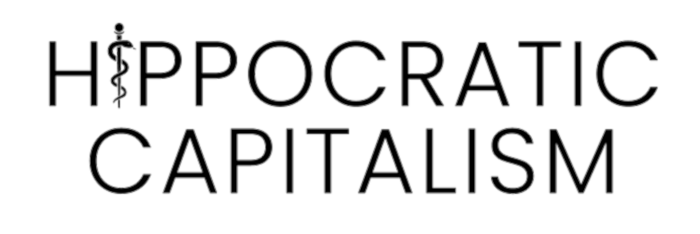Abundance, Not Scarcity
This week’s newsletter is inspired by a sermon delivered yesterday at one of my favorite churches, by one of my favorite preachers (the brilliant Rev. Sally Hitchener) She used the biblical story about the exodus of the Israelites to explain the value of an abundance mindset versus a scarcity mindset. (I was actually in Chicago over the weekend speaking on a panel about AI ethics, but watched the sermon on the SMITF Facebook feed.)
Scarcity leads to conflict, and hoarding, and control. Scarcity is also the basis for competition and much of modern economic thought. Some scarcity is natural, but most of the scarcity in the US healthcare system is manufactured by corporations for self-serving reasons. Take pharmaceutical patents for example. The US Patent system is intended to create incentives to invent useful technologies, by giving time-limited monopolies to inventors. What the inventors do with those monopolies, however, is another story. Pharma companies have increasingly priced new drugs in the stratosphere in order to maximize total revenue, which obviously limits access to those with the most resources and the best insurance plans. It’s particularly egregious in the setting of developing countries where high prices effectively prevent use of the drugs, doubly so when the drug in question is for a disease like tuberculosis. And then when a drug's exclusivity period is supposed to end, companies have gotten really good at extending patent protection for many more years through evergreening. Scarcity as a pharma business tactic isn’t limited to patented drugs, though. PBMs for example have long conspired to keep low priced generics out of the market, as described in this discouraging WSJ article.
Another major form of manufactured scarcity can be seen in the provider market. Physicians (full disclosure: I’m one) benefit economically from the limited supply of medical school slots in the US. Foreign medical graduates boost the numbers a bit, but the US physician establishment has ensured pretty onerous training requirements in order for them to practice in the US. (Foreign medical degrees are accepted in the US, but residency training is not, so that foreign-trained physicians need to repeat residency at a US program in order to obtain a medical license in this country. And residency is no walk in the park.) You can be a top cardiologist or rheumatologist at a top UK or EU academic medical center, yet in the eyes of US licensing officials, you’re less competent than a 2nd year resident in a US training program.
Synergistic with limiting the supply of physicians is limiting the scope of practice of other healthcare professionals such as advance practice nurses and physician assistants. Now, I’m familiar with the arguments from the American Medical Association https://www.ama-assn.org/ and the various specialty societies (disclosure: I’m a fellow of one of them, the College of American Pathologists www.cap.org). They say the patients have the right to be treated by highly trained professionals, and that only a physician should be permitted to make diagnoses and treatment decisions. But shouldn’t patients also have the right of access to a healthcare professional? An abundance mindset would allow all medical professionals to practice to the limits of their knowledge and abilities, not just the limits of their license.
Alternatively, why don’t we create education and training pathways to allow experienced nurses and physician assistants to obtain MD degrees and complete residency without having to go back to square one? One of my favorite thinkers on this topic is Dr. Bill Stead, an internist/informaticist/health system leader. He coauthored this Academic Medicine article that proposes a unified education pathway for all healthcare professionals, so that a nurse for example could use their years of clinical experience toward certification as an MD.
Mental healthcare deserves a special spot on this list. In mental health, the scarcity isn’t so much a result of medical education and licensing, since there is a much broader range of education and training pathways. Certainly there are shortages of psychiatrists, particularly child psychiatrists. But when it comes to therapy, which is the most labor-intensive category of mental healthcare, a broad range of professionals are able to provide this, such as clinical psychologists and social workers. Yet scarcity is still a huge problem as a result of coverage limitations by health insurers. Kate Woodsome makes the argument in this recent WaPo OpEd
So if scarcity in healthcare is harmful, what might abundance look like?
In an abundant system, competition can help keep all the players honest, promote innovation, and reduce the ability of monopolies to exploit patients. But in some domains, such as inter-profession relationships, an abundant mindset would lead to less competition and more collaboration.
In an abundant system, patients rather than profits are the primary goal. Importantly, this means all patients, not just profitable ones (i.e. those with the most resources). Imagine for example that you’re a major children’s hospital located in a large urban area, say, Houston. An abundant mindset would lead you to open satellite locations in underserved areas such as the huge swaths of rural America where children with cancer have to drive hundreds of miles for their clinic appointments. A scarcity mindset, on the other hand, might lead you to instead open your new facility https://www.texaschildrensaustin.org/ in a wealthy city like Austin that already has a well-established major children’s hospital (namely, Dell Children’s https://healthcare.ascension.org/locations/texas/txaus/dcmc).
Being abundant doesn’t mean we have unlimited resources, because we don’t. So abundance requires that we prioritise the most valuable services to everyone, rather than the most expensive services to those who with the most ability to pay. Abundance certainly includes ready access to primary care and mental health care. If that means we don’t have money left over to pay for unproven but pricy cancer screening tests, such I covered in my last newsletter, then so much the better.
